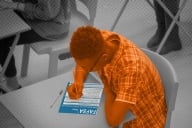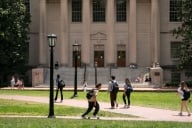You have /5 articles left.
Sign up for a free account or log in.
President Trump on Sunday evening issued new restrictions on travel to the U.S. to replace a 90-day ban on travel for citizens from six Muslim-majority countries. The 90-day ban, which expired Sunday, was widely opposed by colleges and universities concerned about the flow of international students and scholars to their campuses.
The new restrictions limit travel for nationals of five of the six countries included in the expired ban -- Iran, Libya, Somalia, Syria and Yemen -- as well as three new ones: Chad, North Korea and Venezuela. Restrictions on Sudan have been limited.
Unlike in the case of the original travel ban, the restrictions vary somewhat by country, ranging from targeted restrictions on tourism and business travel for certain government officials and their relatives in the case of Venezuela to blanket travel bans for all immigrant and nonimmigrant travelers from North Korea and Syria. The nonimmigrant traveler category includes visiting students and scholars.
For Iran, the U.S. will bar the entry of immigrants and most nonimmigrants, but crucially for higher education will allow entry by holders of valid student (F and M) and exchange (J) visas, “although such individuals will be subject to enhanced screening and vetting requirements.”
For nationals of Somalia, the U.S. is suspending all immigrant travel but nonimmigrant travel will be permitted, subject to the enhanced screening.
For Chad, Libya and Yemen, the U.S. is suspending all immigrant travel as well as nonimmigrant travel for business or tourism-related purposes, but does not appear to be suspending student or exchange visitor travel.
A statement from the White House also said that while the U.S. is not suspending travel for nationals of Iraq, the secretary of homeland security recommends that Iraqi nationals "be subject to additional scrutiny to determine if they pose risks to the national security or public safety of the United States."
The Trump administration said the restrictions are necessary to address the failure of most of the affected countries to share adequate information with the U.S. about terrorism-related risks. The White House said in a statement that the "restrictions are conditional and may be lifted as they work with the United States government to ensure the safety of Americans."
“Following an extensive review by the Department of Homeland Security, we are taking action today to protect the safety and security of the American people by establishing a minimum security baseline for entry into the United States,” Trump said. “We cannot afford to continue the failed policies of the past, which present an unacceptable danger to our country. My highest obligation is to ensure the safety and security of the American people, and in issuing this new travel order, I am fulfilling that sacred obligation.”
This is the third set of travel restrictions issued by the president. The original ban on travel from certain Muslim-majority countries was issued via an executive order a week after Trump took office and took effect immediately, causing chaos at airports and leaving many international students and scholars who happened to be outside the U.S. at the time the executive order was signed temporarily stranded. Civil rights groups condemned the ban as intended to block the entry of Muslims, a step Trump called for during the presidential campaign.
In March Trump replaced that travel ban with a revised one, which was also blocked by federal courts that variously ruled that it amounted to religious discrimination or that the president had exceeded the bounds of his authority in issuing it.
However, in June, the Supreme Court ruled that a modified version of the 90-day travel ban could go into effect. The Supreme Court is scheduled to hear arguments on the ban Oct. 10.
Higher education groups have widely opposed Trump’s travel ban.
The new restrictions go into effect Oct. 18 except for those individuals who were already subject to the 90-day travel ban, for whom the new restrictions went into effect Sunday.








